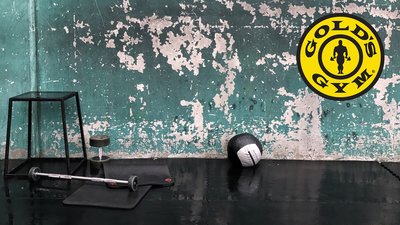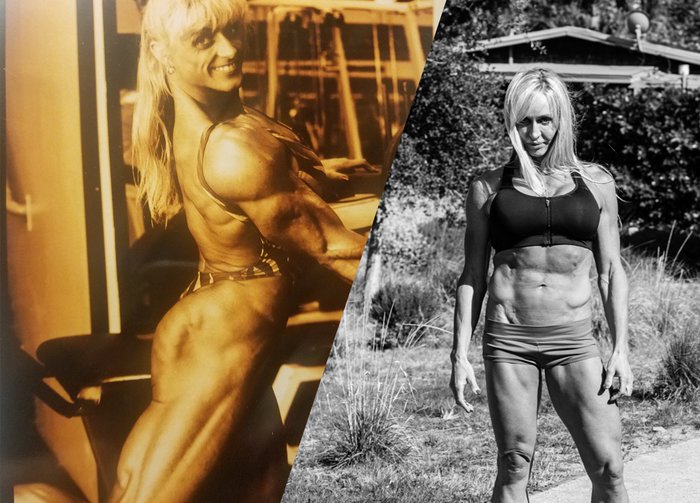If you're going to be a personal trainer, there's no better place to work that Golds Gym in Venice, California. It gets called "The Mecca of Bodybuilding," and having spent 24 years there as a trainer, I can say that the title is well earned.
I was 27 years old when I entered the Mecca in its heyday. It was 1993, right in the middle of what I maintain was a golden era for the gym and the sport of bodybuilding. I had a few training and nutrition qualifications under my belt, but nobody was particularly interested in seeing them. The real qualifications for the job were:
- How buff you looked
- How much you lifted
- Your ability to play well with others (don't underestimate how important this one is!)
Back in the 90s there were over 140 independent trainers working at Gold's. That number is now closer to 40, and many of them have been there as long as me, or even longer. If you visit the Mecca you might not notice them among the chaos, but there are some legends working that 30,000-square-foot floor.
In a place that has lasted for generations, and that thrives on the quest for eternal youth, how do you survive the test of time? Here are my lessons—and you don't have to be in Gold's Venice to use them. If the gym is a major part of your income, or just a major part of your day, then take note.
Lesson 1: Stay Away from Center Stage
To train in Gold's and to work in Gold's are two very different things. A little like a stage performance, there were a few main characters under the spotlight each and every day. You knew them when you saw them. They were the reasons tourists traveled—and continue to do so—from all over the world to enter those famous glass doors and go back home with a story to tell. They're what give Gold's its "wow" factor.
And often, these characters changed with the season. Every year I'd see a few main characters get run out of Gold's, or a trainer or two get kicked out, often for good reason. The Mecca is not the place to make enemies, but it is an amazing place to meet friends.
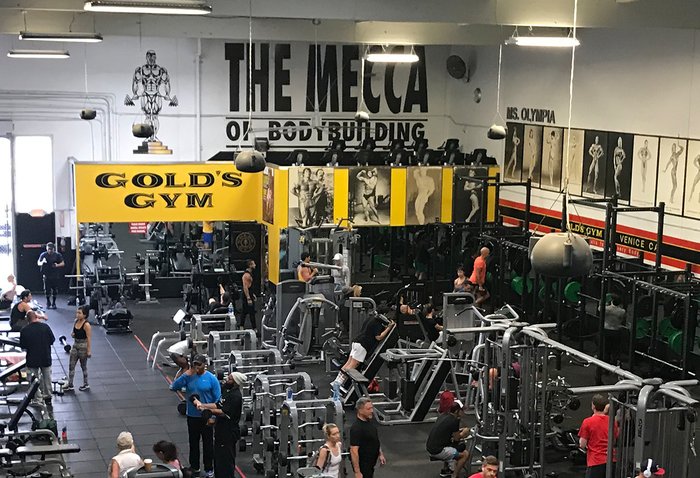
That's all fun if you're in there for just an hour or so a day. If you're a trainer, or just someone with truly elite training goals, your day is far longer. If you're going to play a lead role, it's going to be exhausting and you're likely to tread on some toes. The secret to longevity is to stay in the shadows and do your work. Watch the stories unfold without getting dragged into them.
Of course, for some people it is impossible to stay entirely out of the spotlight. Gold's Venice is brimming with celebrities, and yet it is the only place I know where the famous really can go about their workouts without being overly bothered. You may be training next to 50 Cent, The Rock, Arnold, or Shawn Rhoden, but aside from the odd tourist selfie, they pretty much blend into the crowd. If they can, we all should.
The Lesson for You: Every gym has its own occasional whirlwind of drama going on, and if you're just passing through it can be fun for a few minutes. But if you plan on staying awhile, know when to step back and watch from a distance. No matter what: Do. The. Work.
Lesson 2: Look for Opportunities, and Grasp Them
We all ended up in Gold's because of our love of lifting weights, first and foremost. And once in Gold's, you're rubbing shoulders with plenty of the best and most famous lifters in the world.
They may look a little intimidating, but generally they are the kindest muscle heads you will ever meet. If you're willing to put your ego on the back burner, you can draft the energy of your peers to smash any limitations you may have put on yourself at a different gym.
The opposite is true, too. At Gold's, if you think you're big, there's someone bigger. If you think you're strong, there's someone stronger. If you think you're lean, someone walks in and shows you what "peeled" really looks like.
I'd been in Gold's barely a year when Robby Robinson suggested we train together. I was 27, and he was a legend both for what he had achieved, and what he was still achieving. That year, 1994, he won the Masters Mr. Olympia, and I was able to be part of his preparation. It's that sort of experience you can only get at Gold's Venice.
Robby was a very quiet guy, but that didn't mean he had nothing to teach me. It just meant I needed to pay close attention to learn it! And I picked up so many valuable training tips in that year or so of training.
The following year, I got a lesson in strength. I started training with Billy "Thunder" Smith, a longtime bodybuilder who had recently finished a three-year run on "American Gladiators." Now, there were quite a few 300-pound men in Gold's in the 90s—this was the dawn of the age of Dorian and the "mass monsters," after all—but the weights Billy and his buddy Jim Quinn moved brought the gym to a standstill.
I didn't really know how strong I thought I was, but when I started training alongside Billy for two years, there was one thing I knew: It was either give it a go with the weights he was using (at least some of the time), or strip all the weights off and put them back on for every set for every workout. So, whenever I could, I stepped up to the plate.
Guess what? I gained more muscle in those two years than I had in the 12 years of lifting that came before.
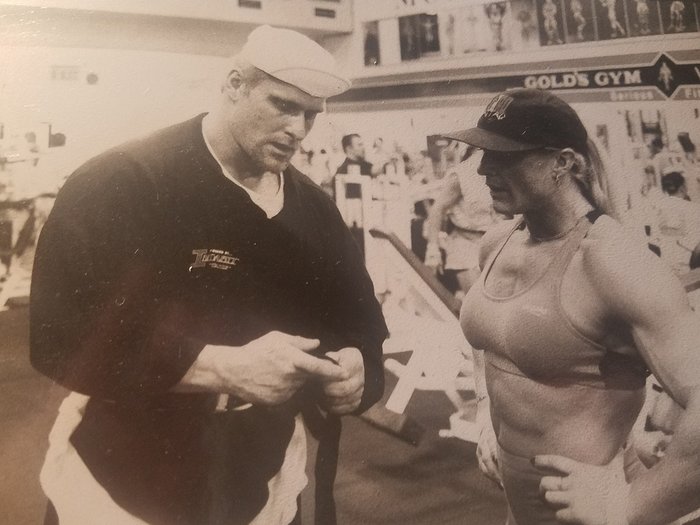
The Lesson for You: To really excel, don't train with someone who makes you look good. Train with someone who gives you a few sleepless nights, an anxious drive to the gym, and someone you're in awe of. It's better to look up to your training partners than to look straight at them. That desire to live up to your partner's example can result in gains you didn't think possible.
Lesson 3: Blatantly Copy, but Give Credit
When I first arrived at the Mecca, I had been training for over 12 years and was already an IFBB pro. But I was still baffled by some of the equipment in the gym.
Going from a 2,000-square-foot gym in the North of England to a 30,000-square-foot gym in SoCal was quite an adjustment, and to make sense of it all, I had to put my pride aside and copy the heck out of the people who knew what they were doing. Seriously, I had no problem watching other people work and trying out their techniques for myself.
There were two people I hounded, especially in my younger years: Charles Glass and Jerry Brainum. And why wouldn't I? Charles is known as "The Godfather of Bodybuilding," and Jerry is "The Muscle Guru," and both nicknames are well earned. Even 20-plus years ago, these guys knew it all, and had seen it all.
In the 90s there were always at least 10-12 people getting ready for the Olympia—including me on a couple of occasions. But whoever they were and wherever they were from, Charles Glass seemed to train all of them! Over the decades I have quizzed Charles whenever I could about his training principles and contest prep techniques. Wouldn't you?
Jerry's experience and research with regard to nutrition and training spans over 40 years, he has written for every publication you can name, and is a straight shooter who has no tolerance for "bro science." I'm a morning person and preferred to train at 4 or 5 a.m., but Jerry was a night owl and could only be found in Gold's at 10 p.m. or later. If there was something I was studying or wasn't sure about, I would go back to Gold's at night just to track him down. Then I would pester him with question after question.
Both Charles and Jerry tolerated me at first, and soon enough, we became dear friends.
The Lesson for You: If you have a Charles or a Jerry in your gym, you can save yourself a lot of time by (politely) bugging the hell out of them. Seeking the advice of others does not reduce your value as a trainer or competitor in any way. I would actually argue the opposite! As long as you're honest and open about what you're doing, what you learn, and who you learned it from, it's to your credit.
Lesson 4: Find Your Niche
In Los Angeles, it seems like everyone is either an actor, a realtor, or a trainer. To succeed in such a saturated environment, it's necessary to find a niche—an area of expertise you can excel in and be known for.
When I arrived at Gold's, everyone was a bodybuilder. Half the guys walked around north of 300 pounds and the girls were already on every cover of the fitness magazines. So being a professional in the sport wasn't going to do me much good. I believe there are two things that over time served me well.
First, I devoted myself to learning about nutrition. Back in the days before apps and online nutrition programs, clients were more reliant on their trainers—and very few trainers could handle anything beyond a basic bodybuilding diet. In a gym like Gold's, the best marketing you could do was through the transformation of your clients. My clients changed, and people noticed that.
No, your clients don't have to get onstage. But when they get stronger and leaner, or when their posture or confidence improves, it is a reflection of your work. People notice that.
The second thing that served me well: Once I retired from competition in 1996, I decided I wouldn't be "stage ready" twice a year anymore and would instead simply focus on maintaining an attainable year-round physique.
Of course I wondered if it would affect my business, and it did: Almost instantaneously, my workload doubled! I had thought my work hinged on my being a competitor, but it was exactly the opposite. My clients couldn't care a hoot if I stepped onstage! My weight no longer fluctuated 20 pounds, and I built a reputation as the trainer who was in shape all year. It was this year-round consistency that people admired more than my bi-annual striated ass.
I can't tell you how many times over the years I have been approached by strangers in the gym who have told me that they have been visiting Gold's for years, and that I always look the same.
The Lesson for You: What you take for granted, people pay attention to. It used to drive me crazy that outside of the gym people would always assume I was a trainer. In hindsight, that was not a bad thing. Build your expertise, and don't shy away from it.
Lesson 5: It's Not a Job, It's Your Career!
It's great to not have to put on a suit and half an inch of makeup to go to work, but that doesn't mean that you can take your role as a trainer casually.
You can have more qualifications than any other trainer in your gym, but if you don't shower, turn up late, take a personal call, or cancel last minute on your client, you will not last long. Like begets like: If your training gig is not your priority, your clients won't make you a priority.
The Lesson for You: This may sound like it just applies to trainers, but it can be applied to any job. If you carry Tupperware and eat on your client's dime, you are diminishing their value. If you answer a call when they're doing a set, the same is true. If your CPA was having lunch or taking calls during your appointment, it would be insulting.
No matter how big or small your job, treat it with the same professionalism. Do this, and you will stand out. Don't do it, and you will stand out for the wrong reasons.
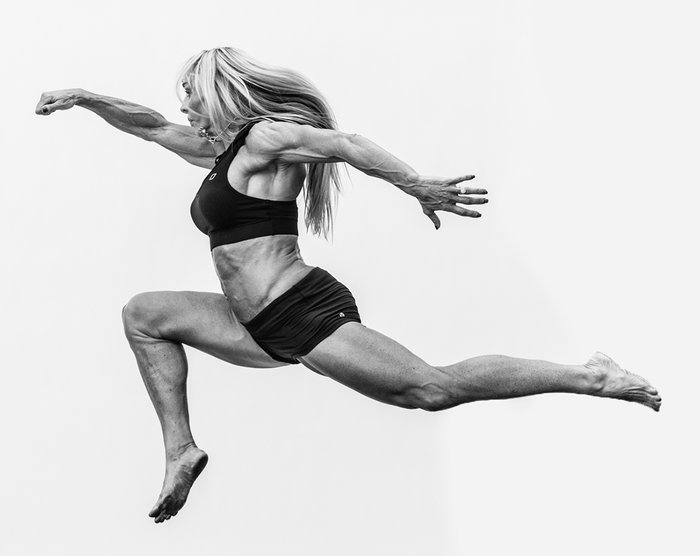
Lesson 6: Don't Let Fame Blind You
Gold's had—and still has—no shortage of celebrities. It was tempting to focus my efforts primarily on them. Honestly, if you're a trainer in Los Angeles and haven't trained a celebrity, it's probably a strategic move on your part because they are literally everywhere!
It's always great to have these names and physiques to add to your resume (or today, your website or Instagram feed). They can increase your visibility, and their names sometimes bring more short-term value than any continuing education credits you've done. They are also generally very fun to work with and take their training seriously.
However, having trained quite a few celebrities over my 24 years at Gold's, I can say that there are some big downsides. They leave town for months at a time and have erratic schedules that you have to work with. If you're training them for a movie, they can take up a huge amount of your time, then when they disappear, you have enormous gaps in your day that you now have to fill.
In that time, you will have probably turned away—or just not noticed—plenty of potential "bread and butter" clients. Sure, you can usually charge a high-profile client for the inconvenience they pose, but the ultimate math often doesn't make sense.
The Lesson for You: Your gym may not have "celebrities" per se, but wherever you're a trainer—or wherever you work—there will always be those big fish you want to hook. They can undoubtedly create a buzz about your work, but be sure to balance your portfolio with your regular day-to-day rock stars.
No matter your calling, think in broad terms, not just big terms. That's advice you can build a career by whether you're training clients in the Mecca of Bodybuilding, out of your garage, or any point in between.

